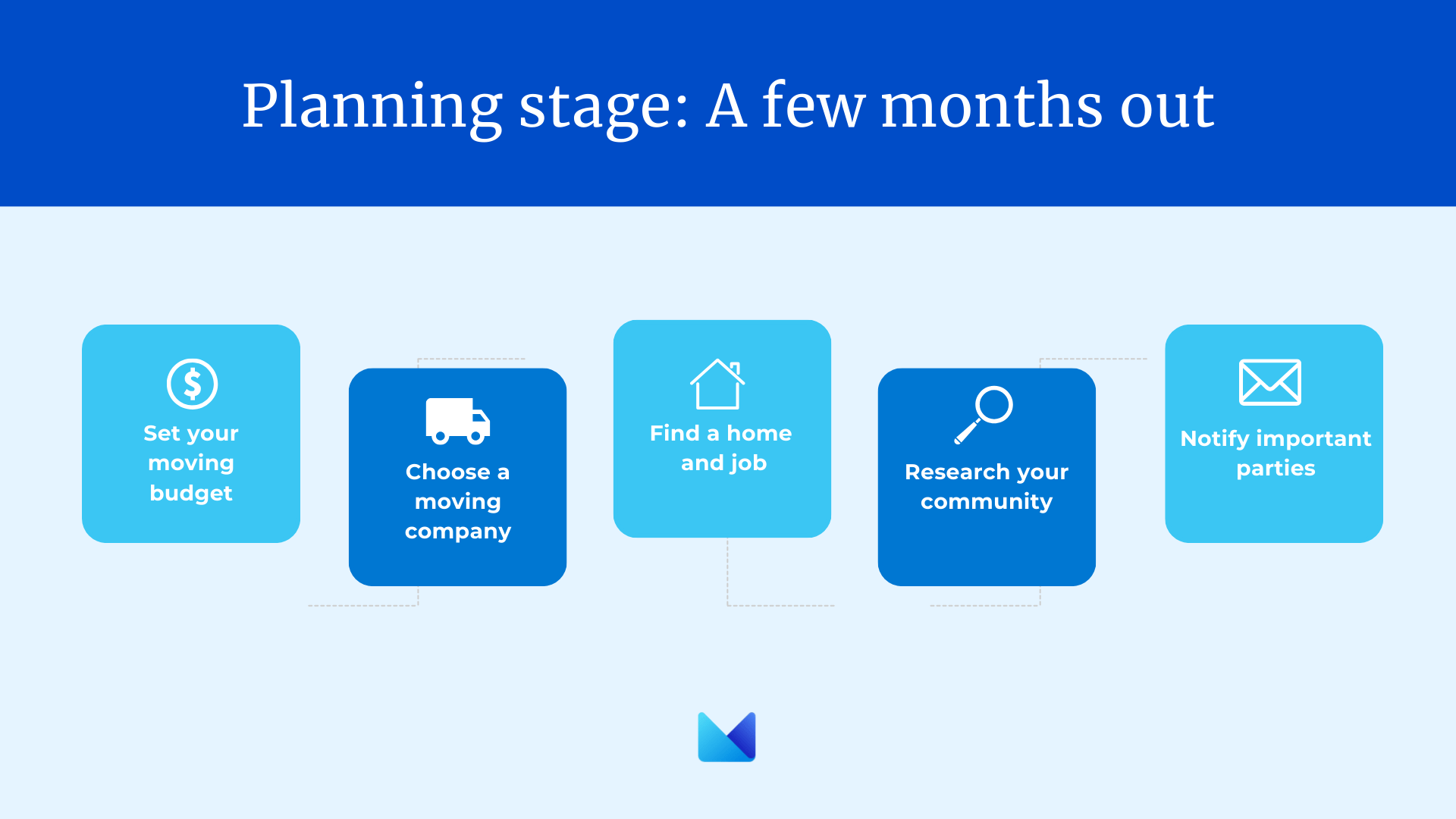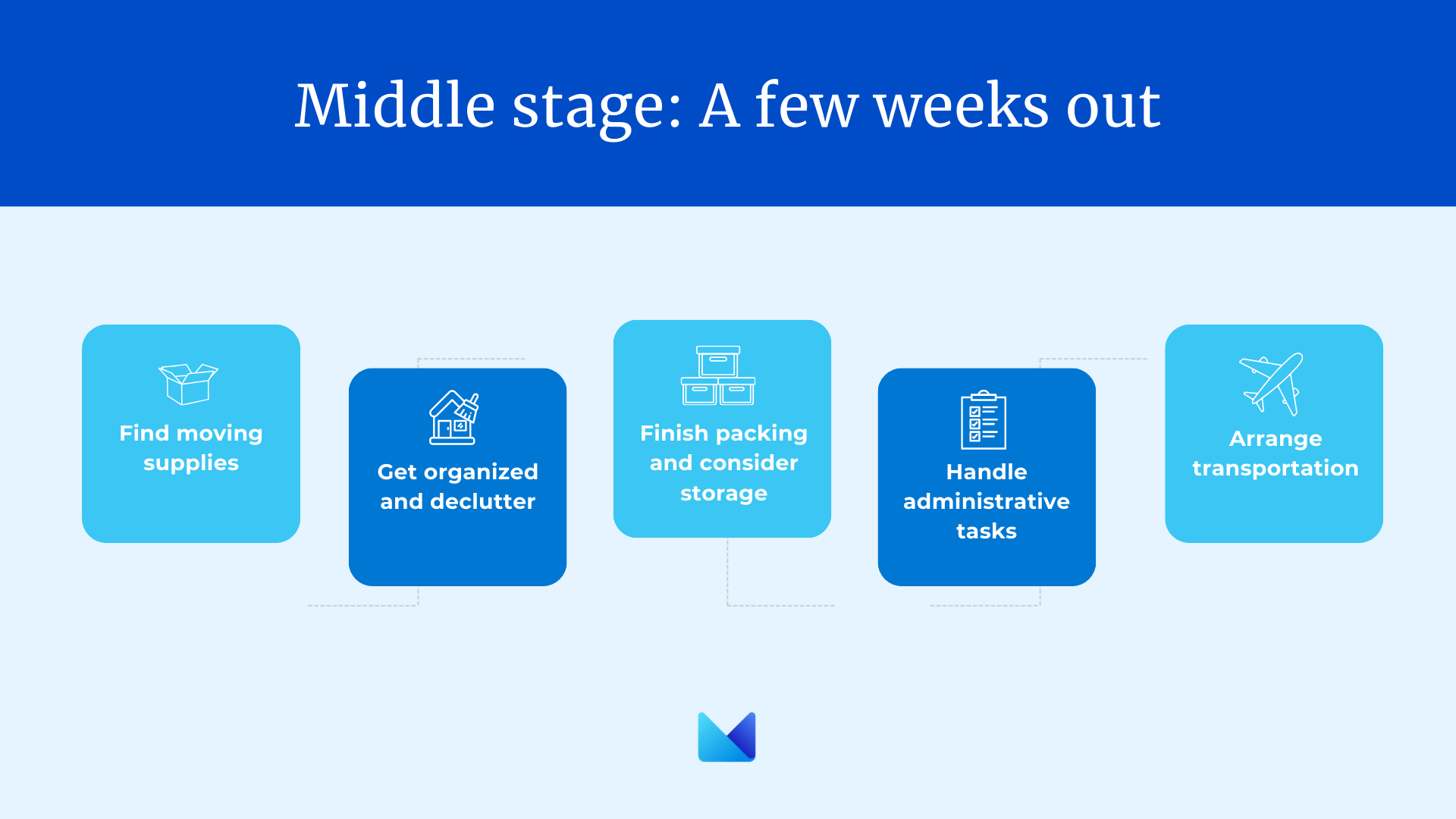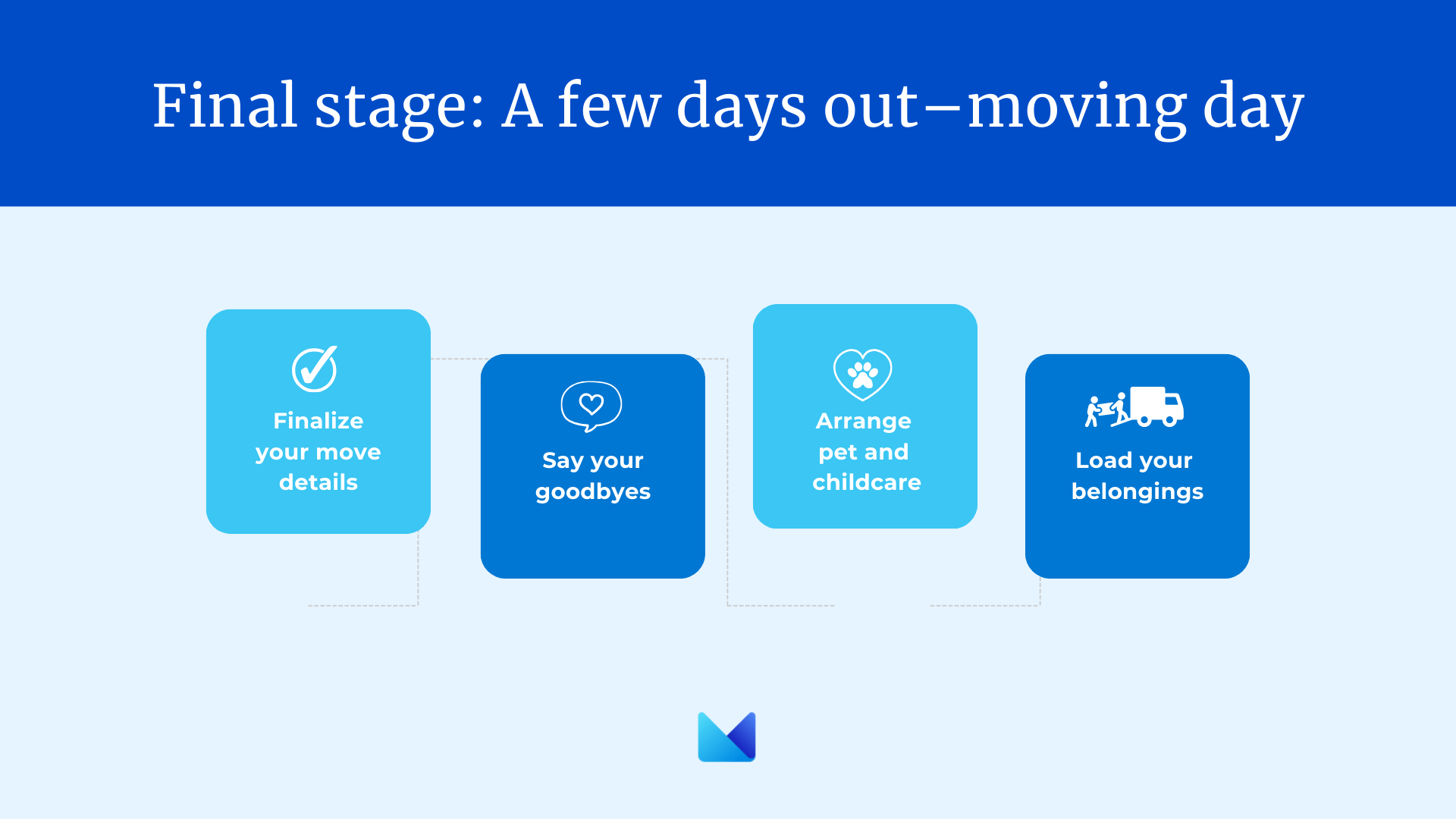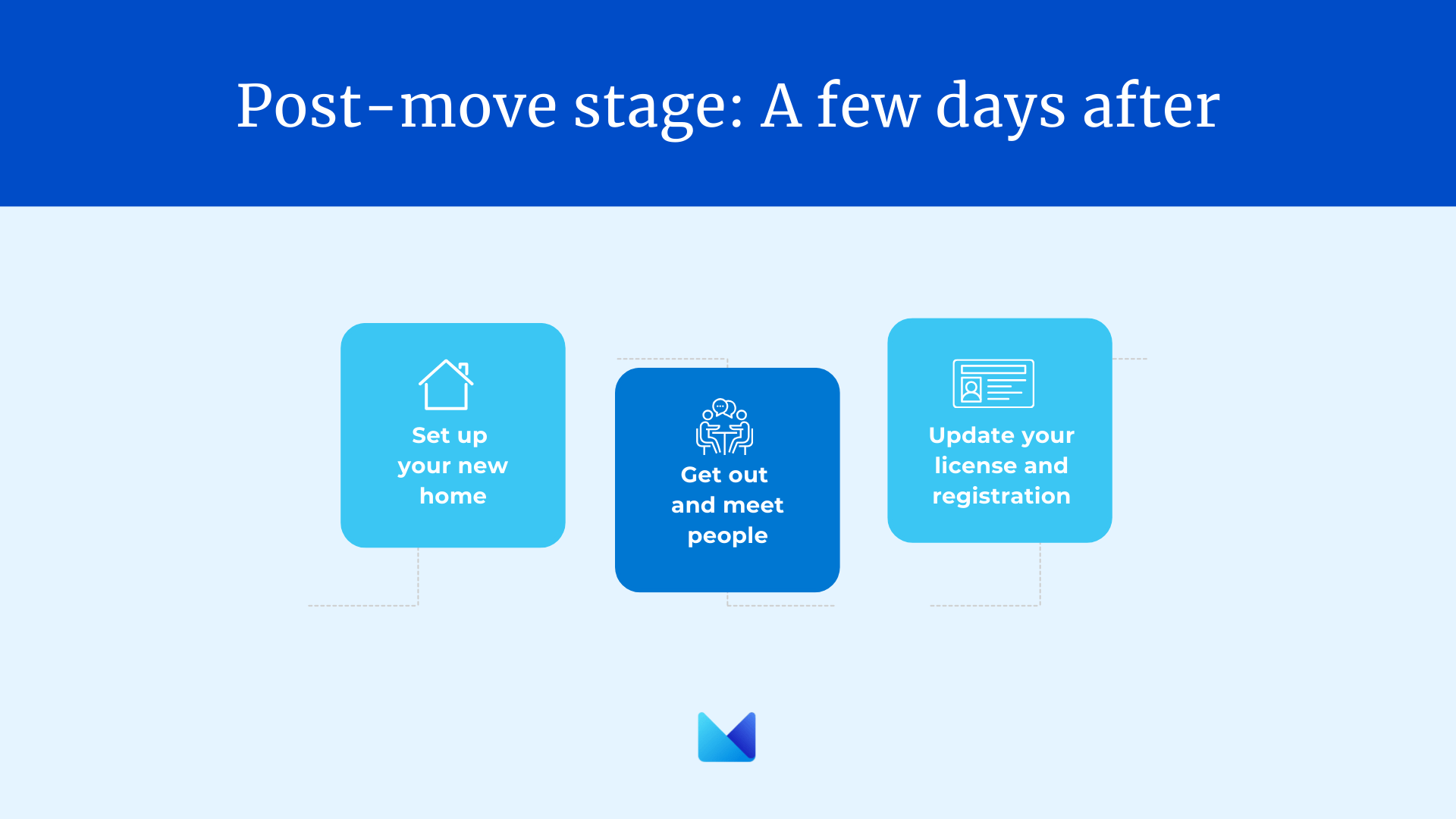Moving Out of State Checklist (Printable Moving Guide)
Here’s the quick answer: When you move out of state, you need a checklist that covers budgeting, packing, booking a mover, and administrative tasks like changing your utilities and updating your address and driver’s license.
Our goal at moveBuddha is to ensure you have a successful move, so we put together this list of moving resources to prepare you to move to a new state. Read on and download our printable out-of-state checklist to simplify your move.
Out-of-state moving checklist
Use our out-of-state moving checklist to make your move from state to state an easy one.
Download our out-of-state moving checklist
Save our printable moving-out-of-state checklist to ensure you don’t miss any steps as you plan for your long-distance move.
Planning stage: A few months out

1. Set your moving budget
Long-distance moving expenses can add up quickly. Your budget should factor in the size of your home, the distance you’re moving, and what services you need. You could pay for anything from a moving truck and containers to a full-service move with packing supplies, furniture assembly, and car shipping.
Get started: Once you determine your budget, you can get quotes from moving companies to see which ones fit your needs. Use our moving cost calculator to tally up your moving expenses and compare the prices of different long-distance moving companies.
2. Choose a reputable moving company
We’ve researched and compiled a list of the best interstate moving companies you can use as a starting point. When you’re looking for a mover, you should also take the steps below to choose a company with a solid track record:
- Get free quotes: Moving company pricing varies, so you should always get moving quotes from each of the companies you’re considering hiring.
- Vet the moving company: Check licenses, insurance, and the credibility of the moving company you want to use to move out of state. Look them up on the Better Business Bureau (BBB) website and search FMCSA mover profiles.
- Read the fine print: Thoroughly review the company’s terms and conditions to understand what they’re offering and what they’re responsible for.
|
|
|
|
3. Find a home and a job in your new state
Find a place to live before you arrive in your new state. It’s a good idea to have some neighborhoods and listings picked out so you can visit as soon as you arrive. A realtor can also help give you a local’s perspective on different areas.
While you’re looking at homes, explore the local job market. If you aren’t moving long distance because of a job opportunity, be sure you have a way to earn money before moving out of state.
Start the search: Use our guide to find a job in your new city before you move.
4. Research your new community
Search your new city on Google or social media to find restaurants, coffee shops, gyms, and other businesses to visit. You can also use the sites below to learn about the area you’re moving to:
- Schools: GreatSchools gives you ratings and comparisons on local schools so you can figure out the best areas before buying a home in your new state.
- Crime rates: Use NeighborhoodScout to check local crime rates and search sex offender registries to find a safe neighborhood.
- Commuting options: Look at commute times, traffic, and public transportation options. Walkscore.com ranks cities based on walkability, public transit, and biking options.
- Cost of living: Get a sense of how different your costs will be in your new city. This can help if you’re negotiating salary or a relocation package with your employer.
Or simply check out our moving to state guides below.
Moving to state guides
5. Notify important parties of your move
Give the right people a heads up. Start with your employer, especially if you’re relocating for work or you’ll need to request time off for the move. Go ahead and let your bank and credit card companies know to avoid disruptions in service or potential fraud alerts tied to unusual activity in a new location.
This is a good time to inform your insurance providers so they can update your coverage or research new policies if necessary. If you have kids, begin notifying schools and requesting transcripts for the transfer process.
Middle stage: A few weeks out

6. Find moving supplies
When you’re prepping for your cross-country move, you need to find sturdy boxes in various sizes, packing tape, bubble wrap, and markers for labeling. Some moving companies like International Van Lines provide these items for purchase and grocery stores may let you get free boxes.
A dolly or hand truck can also help with heavy item on DIY moves. For fragile items, consider additional padding. Some of the best moving companies offer custom crating for fragile items to protect them throughout the move. And you’ll probably need a good toolkit handy for disassembling and reassembling your furniture.
6. Get organized and declutter
Whether you’re renting a moving truck or hiring a full-service moving company, you need to know how much stuff you’re moving. Most moving services are priced based on the size of your move. Before you move, take stock of your belongings and try to picture them in your new home.
If you can’t envision yourself using anything and it doesn’t have sentimental value, you can declutter and reduce the cost of your move by selling, donating, or throwing it away. If you have any receipts from donations, hold onto them as they might be tax-deductible.
7. Finish packing and consider storage options
To get ahead of your out-of-state move and ensure you don’t have to reschedule, start packing as early as possible. Review some of our top moving and packing hacks and don’t forget the essentials like moving boxes and packing tape.
You should also consider your storage options if you can’t move right into your new home. Many professional movers and moving container companies offer 30 days of free storage when you book a move. If you need storage for longer than that, get quotes for long-term storage options.
Find a storage company: Here are some of the best self-storage companies you can hire.
8. Handle administrative tasks
Make sure you don’t let any of the following steps slip through the cracks as you prepare for your move:
- Set up utilities: Contact utility companies to disconnect or transfer services like your cable and internet, gas, water, propane, and electricity.
- Forward your mail: USPS mail forwarding is easy! Request forwarding at least a few days before you move so it starts delivering to your new address on time.
- Transfer professional licenses: If you work in a profession that requires licensing, such as a lawyer or nurse, make sure you’re licensed in your new state.
- Fill prescriptions: Finding a new doctor can take time. If you have any existing prescription medicines, get them filled prior to moving.
- Update your subscriptions: If you subscribe to magazines, newspapers, or meal subscription boxes, let them know about your change of address.
Related: Review our complete change of address guide
9. Arrange transportation
If you haven’t already, now is the time to make arrangements for getting to your new home. If you’re flying, compare ticket prices and book flights in advance, especially if you’re coordinating with a move-in date.
Don’t forget to consider how your car will get there—will you drive it, tow it, or have it shipped? For long-distance moves, timing and logistics can get tricky, so getting your transportation plans in place early will make the rest of your move much smoother.
Final stage: A few days out–moving day

10. Finalize your move details
As moving day gets closer, you need to lock in the specifics with your moving company or container service. Confirm your booking, double-check the pick-up and delivery dates, and make sure all the paperwork is in order.
Review your estimate and ask about any extra fees that could pop up—like charges for stairs, long carries, or last-minute changes. If you opted for moving insurance or valuation coverage, now’s the time to understand exactly what’s included.
11. Say your goodbyes
Moving is a major undertaking. During all the hustle and bustle, don’t forget to schedule time to say goodbye to the people and places you love. You may be planning to spend time with your loved ones while they help you pack, but make sure you leave time for a proper sendoff.
While this might not seem like the most important step on the list compared to the practical pointers above, you should prioritize getting closure before you say goodbye to your home.
12. Arrange pet and childcare
Moving day can be chaotic, and having pets or young kids underfoot can make things even more stressful for everyone involved. If you can, arrange for a trusted friend, family member, or sitter to watch your children or pets during the heaviest parts of the move.
Not only will this help keep them safe and out of the way, but it also allows you to focus fully on coordinating movers, loading items, and dealing with last-minute tasks. If they’ll be with you during the move, prep a small kit with snacks, toys, and comfort items to keep them calm and occupied.
13. Load your belongings
If you’re going the DIY route, aim to load heavier items like furniture and appliances first, securing them with straps and padding to prevent damage. Keep essentials like an overnight bag, important documents, and valuables separate so they’re easy to access.
If you’ve hired movers, make sure someone is available to oversee the process, answer questions, and do a final walkthrough before everything’s on the truck. Taking the time to load things properly can save you a lot of stress (and broken items) when you’re unpacking on the other side.
Post-move: A few days after

14. Set up your new home
Once you’ve arrived, it’s time to make your new home your own. Start by unpacking the essentials like bedding, toiletries, and kitchen basics so you can function right away without digging through boxes. Set up your utilities if they aren’t already running, including electricity, water, gas, internet, and trash service.
Take a quick inventory to make sure everything arrived safely and note any damage if you used movers. This is also a great time to change the locks, test smoke detectors, and locate the circuit breaker and water shut-off valve. Little by little, it’ll start feeling like home.
15. Get out and meet people
As you settle into your new home, focus on finding a community to get involved with. You can check out platforms like MeetUp.com or Eventbrite to find new groups of people to connect with and events to attend in your new city.
Try to find groups and attend events that center around your passions and hobbies to discover like-minded people to spend time with. This will help you to settle into your new state and build meaningful connections with people in your area who can make you feel more at home.
16. Update your vehicle registration and driver’s license
Once you’ve settled into your new state, don’t forget to update your driver’s license and vehicle registration. It’s not just a formality—it’s usually a legal requirement. Most states have a time limit (often 30 to 60 days) to complete this process after establishing residency.
Visit your new state’s DMV website to find out what documents you’ll need, such as proof of address, your current license, and your vehicle’s title or registration. Some states may also require an emissions or safety inspection before registering your car. Getting this done early helps you avoid fines and ensures you’re driving legally in your new home.
Bottom line
Moving across the country is a big decision, one that warrants some careful consideration. By spending some time upfront planning for your out-of-state move, you can make it as seamless as possible.
From budgeting and comparing moving companies to packing up your stuff and exploring all your new city has to offer, there are a handful of steps you can take to make your move a success.
Need a little extra cash to help with moving costs? Our moveBuddha Better Moves Project offers movers a $500 moving stipend in exchange for documenting their personal moving experiences with various companies. You can apply for this exciting moving grant here.
Not what you were looking for?
Check out other categories that can help you find the information you need!





